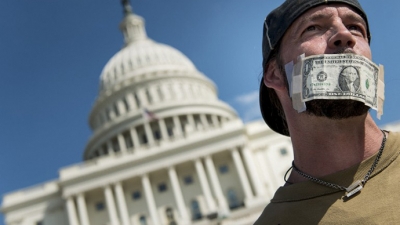 SHAFAQNA (International Shia News Association)� Standard & Poor's says the shutdown in total cost the US economy $24 billion, or $1.5 billion per day, the rating agency said Wednesday. The agency also estimated the shutdown will pare fourth quarter GDP by 0.6 percent.
SHAFAQNA (International Shia News Association)� Standard & Poor's says the shutdown in total cost the US economy $24 billion, or $1.5 billion per day, the rating agency said Wednesday. The agency also estimated the shutdown will pare fourth quarter GDP by 0.6 percent.Obama has signed legislation that will avoid a technical debt default, ending the 16-day partial shutdown of the government that has cost the world's largest economy billions of dollars.
"The bottom line is the government shutdown has hurt the U.S. economy," the statement said.
Moody�s Analytics has estimated the government shutdown could cost the US government up to $55 billion, the same amount as devastating Hurricane Katrina in 2005.
The deal will reopen the government after 16 days of partial shutdown and fund spending through January 15 while extending the $16.7 trillion debt ceiling through February 7. This time frame would be longer than the 6-week extension Obama promised to veto.
US Speaker Boehner did not block a vote on the legislation in the House, as the lower chamber passed the bill 285-144, putting an end to the weeks-long stalemate.
The Senate passed the plan earlier Wednesday by a vote of 81-18.
If the ceiling wasn�t lifted by October 17, the world�s biggest economy would not have had enough cash on hand to pay its bills.
Previously, IHS Global Insight, a Massachusetts-based research firm, estimated the shutdown was costing America $1.7 billion per week in lost economic output according to a study.
Shutdown.com, whose data models and averages the IHS estimate, marks the cost of the government shutdown at $4.7 billion.
The financial burden of the shutdown has already surpassed the at least $2 billion in destruction brought by floods and mudslides in Colorado in September, according to Eqecat Inc., a California-based catastrophe-risk consultant.
Damage is done
In place for almost a century, first introduced in 1917, the US has never defaulted on their debt. Republicans and Democrats have used the debt ceiling as a political gambit to rehash budget wars, and every time, put investors on nerve and world markets on edge. These political games have damaged the US' reputation, and could have a lasting effect.
State-owned Chinese media lambasted the US for creating �manufactured crises�. China, which holds the lion's share of US foreign debt in dollar reserves, nearly $1.3 trillion, would have a lot to lose if it wakes up on October 18 and the US dollar has tanked and Treasury bonds and yields fall.
Fitch Ratings agency announced on Tuesday it has put the United States� �AAA� credit rating on review because of the stalled debt ceiling negotiations.
The �political brinkmanship� and �reduced financial flexibility� of the US were cited as reasons to consider downgrading the superpower. The 26 day shutdown in 1995-1996 cost the US economy over $2.1 billion in current dollars, according to the Office of Management and Budget Data.
However, the far-reach of the American economy and the dollar as a reserve currency may preserve the US�s dominant role in the world economy.
�While the US economy still growing and remains the most efficient in the world, it cannot worry too much about their image,� Igor Nikolaev, director of the strategic analysis department at PKF told RT.
US gross domestic product is still projected to grow 2 percent in the fourth quarter, but some economists worry the dollar, already at an 8-month low, is at more of a risk because of the default, and the more politicians play with fire and brinkmanship the markets will flinch.
Last time Congress debated the debt ceiling in 2011, Standard & Poor dropped the United State�s ratings from AAA to AA+.
The first shutdown in 17 years hit America at a vulnerable time, as it is still digging its heels out of recession and starting to recuperate from the 2008 financial crisis, which stemmed from America�s �too big to fail� banking industry.
By Shafaqna
The Iran Project is not responsible for the content of quoted articles.











